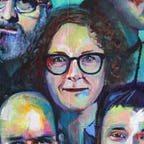Ofrenda
My offering for the Tzompantli 2023 exhibition by Opuntia Art at NFT Factory Paris.
Humans have the strangest rituals. We believe in the most far fetched notions. For some an omnipotent God is an absurdity, for others, it’s God that keeps them grounded. But for all of us, no matter who we are, what we believe in, the color of our skin, our gender, our language, our culture, one thing is certain: there is no escaping death. We may fret about our art, and the price we pay for it, we may fret about who we are and what we are doing with our time. Our days may be consumed in the infinite fires of longing and regret. We strive hard to leave a mark in the world, while we are all facing death.
Rich, poor, foolish, smart, beautiful, ugly, strong or weak: death does not discriminate. It’s the ultimate reality check.
In Mexican culture, this human certainty has been understood since before the Spaniards arrived, bringing the stench of death on their ships, with their firearms and their diseases. Perhaps the conquerors thought they had the exclusive rights to wars, violence and cruelty, yet they encountered a culture that looked death in the eye, that had no qualms ending tournaments with human sacrifices.
Death for the Aztecs was an honor, not an ending. It was a way to appease the gods. And so it was everywhere; welcomed, feared, mocked, and endlessly portrayed in parchment, bone, and stone.
The Tzompantli is a ledger of human skulls, an accounting of the dead. Only in death we are all the same. All reduced to bone.
The ancient Mexican relationship to death has outlasted cultural cataclysms, other faiths with different ideas of the afterlife, revolutions, and scientific progress. It is immortal.
In Western culture it’s a taboo to mention death. In Mexican culture, our chumminess with death may have the unintended consequence of tolerating too much bloodshed, a sense of fatalism that may feed resignation at life’s endless cruelties, the opposite of endeavor.
But there is much wisdom in acknowledging the end of our journey. Facing death may give us the resolve to use our time in life as best we can.
The Day of the Dead reframes what awaits us. It encourages us to leave our fears behind, to make peace with the end. It reassures us that death is only a continuum of life, that when we are gone, those who remain will visit our graves bringing bright orange cempazúchitl flowers, with our favorite tequila and our beloved foods in tow. They will tell our stories, sing songs, get drunk, and commune with us. We will never leave them and they will never leave us.
This Tzompantli is our ofrenda, our offering as artists to honor and appease the gods of art and creation, to celebrate life and commune in the fact that we are all made of the same stuff.
